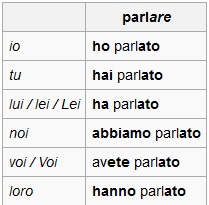If you already
know French, then you are in luck because this task is simplified thanks to the shared origin of the
languages. Italian -ere verbs that have the stress on the next to the last syllable (ére) tend to
correspond to French verb infinitives ending in -oir and Italian verbs ending in an unstressed -ere tend to correspond to French "re" verbs.
Here are some examples (remember that the stress mark is not written in Italian - otherwise it would be easy!):
Stress on ére = French verb ending in -oir
sapére = savoir
avére = avoir
potére = pouvoir
volére = vouloir
sedére = asseoir
vedére = voir
sapére = savoir
avére = avoir
potére = pouvoir
volére = vouloir
sedére = asseoir
vedére = voir
Stress not on ere = French verbs ending in -re
pérdere = perdre
scéndere = descendre
rídere = rire
conóscere = connaitre
rómpere = rompre
méttere = mettre
préndere = prendre
léggere = lire
náscere = naitre
báttere = battre
etc. etc.
There are some exceptions (aren't there always) and some French verbs
which are completely different from their Italian counterparts (temere =
craindre), but this concept can be a great head start.
Huge List of TV Shows with audio in Italian other Languages Available on U.S. Netflix
Huge List of TV Shows with audio in Italian other Languages Available on U.S. Netflix





1 comment:
Great tip!!
Post a Comment